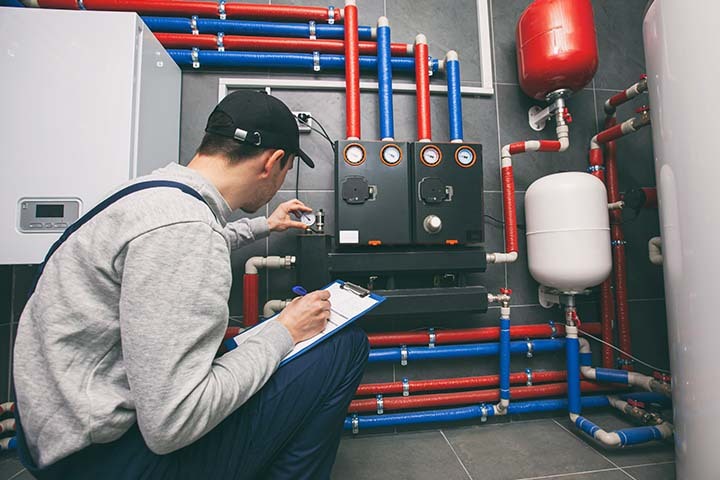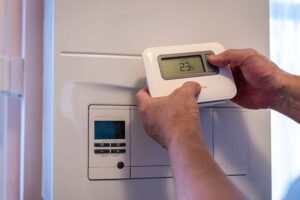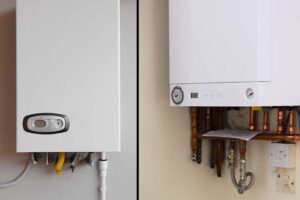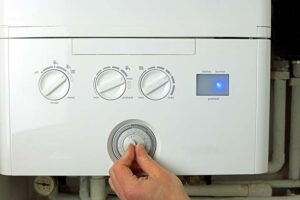The British heating market is changing rapidly. With the growing energy bills, strict emission laws, and pressure on green energy, many households are now thinking of turning on electric boilers.
If you are considering one for your home in 2025, you are not alone. Several household owners replace the gas boiler with an electric one because they are easy to install, require little maintenance, and better align with long-lasting carbon emissions in the UK.
In this full guide, we will cover everything about the installation of an electric boiler in the UK. You will learn how the process works, average installation costs, wiring requirements, professionals, oppositions, and how they compare to gas boilers.
We will also answer general questions such as “Can I set up an electric boiler myself?” And “is it worth installing an electric boiler in the UK?”
What is an Electric Boiler?
An electric boiler is a heating system that uses electricity instead of gas or oil to produce hot water for the radiator and pipes. It works easily.
The cold water enters the unit, passes through a heating element powered by electricity, and then rotates through your home. Unlike gas boilers, they do not burn fuel inside your house or produce carbon emissions.
Many brands now provide advanced models with digital control, smart thermostats, and compact design. Worcester Bosch Electric Boiler Installation Range is one of the most popular in the UK, and is trusted for quality and reliability.
Why Choose an Electric Boiler in the UK?
The main causes that lead many homeowners to choose electric boilers are. Most devices work with around 99–100% efficiency. This means that almost all the energy you pay for is converted to heat. In comparison, gas boilers usually lose some energy through gas gases.
Electric boilers are also a good option if:
- You live in a flat or smaller property.
- You do not have access to the gas grid.
- You want a quiet, compact heating solution.
- You are planning for a low-carbon future.
Although the cost of running may be higher than gas (because electricity is more expensive per kWh), their installation is usually cheap and easy.
Step-by-Step Electric Boiler Installation Process
Installing an electric boiler in the UK is not as complicated as a gas system, but it still requires professional work. This is how the process usually goes:
1. Initial Survey
A heating engineer will visit your home to check the property size, the hot water requirement and the cabling layout.
They will help you determine the right capacity, which is often measured in kilowatts. For most medium-sized homes, a 15 kW electric boiler is a regular option.
2. Choosing the Boiler
You can choose from different models and brands. Prices vary depending on capacity, control, and facilities. Electric boilers in the UK are between £ 800 and £ 2,500 just for supply.
3. Preparing the Space
The old boiler, if any, is disconnected and removed. The location for the new is clear. Since the electric boiler does not require the fuel or gas line, the process is easier.
4. Wiring and Power Setup
This is an important step. Electric boilers pull too much power. The installer should ensure that your property’s electrical system can handle the load.
Requirements for an electric boiler typically involve a dedicated circuit and suitable fuse protection.
5. Water Connections
The boiler is attached to your central heating system and the hot water pipes. Press and flow are tested to ensure proper circulation.
6. Testing and Handover
The engineer runs the system, checks for leaks and sets the control. They will also show you how to use the thermostat, timer and safety facilities.
Electric Boiler Installation Cost in the UK (2025 Update)
One of the most common questions is “How much does it cost to install an electric boiler in the UK?” The answer depends on the model, size, and complexity of your home.
- Supply cost (boiler only): £800 – £2,500
- Labour cost (installation): £500 – £1,200
- Total average installation cost: £1,500 – £3,700
If you need an electrical upgrade, such as a new circuit board or rebirth, it costs more. Since the electric boiler does not require a fuel or gas connection, it is often cheaper to install than a gas system.
Running Costs and Efficiency
While the installation is cheap, the moving cost of the electric boiler is higher than the gas boiler. The driving costs for an electric boiler depend on use and power tariffs.
On average, heating a medium-sized British house with electric boilers can cost between £1,500 and £2000 per year, depending on electricity prices. Gas, compared, is usually cheaper per heat unit.
However, there are benefits to efficiency. An efficiency assessment of the electric boiler is close to 100%, so no energy is wasted.
If renewable power or solar panels are connected, costs can be significantly reduced, causing the system to become green and more cost-effective long-term.
Pros and Cons of Electric Boilers
Like any heating system, electric boilers have strengths and weaknesses.
Pros:
They are compact, calm, and easy to install. No flu or fuel storage is required. Maintenance compared to gas boilers is minimal. They have excellent efficiency and are ideal for small homes or apartments.
Cons:
The most important negative aspect. Electricity is more expensive than gas, which means high operating costs for larger houses. They may also require an advanced power supply, especially if you install a large 15 kW electric boiler.
Electric Boilers vs Gas Boilers
The gas usually wins at moving costs when comparing, which is cheaper, a gas or electric boiler. Gas is still cheaper per kW than electricity in the UK. This means that heating a large family house with electric boilers can be expensive.
However, electric boilers are often cheap to install. They also do not emit anything at the point of use, which makes them more environmentally friendly. With the British gas boiler after 2035, electric models can be more common in new homes.
Can You Install an Electric Boiler Yourself?
Many homeowners ask, “Can I install an electric boiler myself?” The short answer is no. Installation involves high-voltage wiring, plumbing, and safety checks.
UK law requires a qualified electrician and heating engineer to carry out the job. DIY installation can be dangerous and may void warranties or insurance.
Best Electric Boilers in the UK 2025
When searching for the best electric boiler UK, consider brands like Worcester Bosch, Heatrae Sadia, and Elnur.
Worcester Bosch electric boiler installation is especially popular for reliability and aftercare. Always choose a boiler with the right kW rating for your property size to ensure efficiency and comfort.
Tips for a Smooth Installation
To make your installation process easier in 2025, keep these tips in mind:
- Get multiple quotes from certified installers.
- Ask about electrical checks before buying your boiler.
- Consider smart thermostats to reduce running costs.
- If you have solar panels, link your electric boiler for cheaper energy use.
- Always check the warranty and aftercare services.
Final Thoughts
Electric boiler installation in the UK is becoming more popular in 2025. With efficiency close to 100%, easier installation, and no need for gas, they offer many advantages.
However, you should always weigh the running costs against gas and consider your property size before making a decision.
If you are in a flat or small home, a 15kW electric boiler could be a perfect fit. If you want future-proof heating, brands like Worcester Bosch offer reliable options.
Get quotes, check your wiring, and consult professionals before installation. With the right planning, an electric boiler can be an efficient, safe, and eco-friendly solution for your home.
Frequently Asked Questions
On average, supply and installation cost between £1,500 and £3,700 in 2025. Larger homes may pay more if electrical upgrades are needed.
It can be worth it if you live in a flat, a small home, or a property without gas access. It is also a future-ready choice as the UK moves away from gas boilers.
Gas is cheaper to run, but electric boilers are cheaper to install and more eco-friendly. The choice depends on your home size and long-term plans.
Most boilers need a dedicated circuit, suitable fuse protection, and an electrical system that can handle the load. A qualified electrician must set this up.
No. UK regulations require a professional to handle both electrical and plumbing work. DIY is unsafe and may void your warranty.








